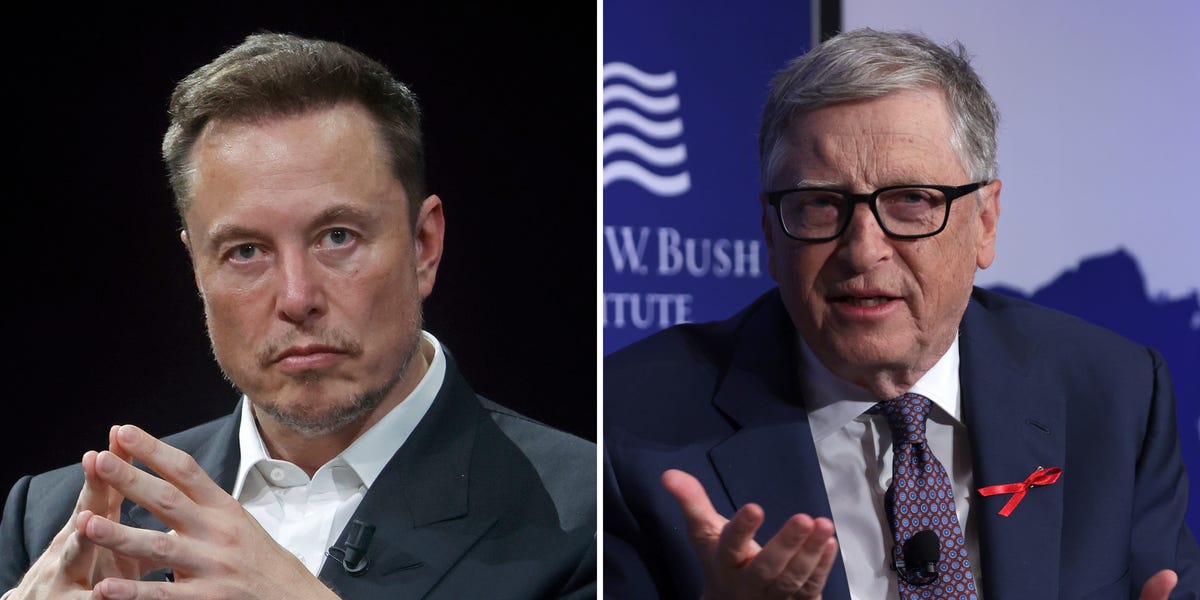Bill Gates name-checked Elon Musk and Steve Jobs during a fireside chat on Thursday. The Microsoft founder said he considers himself “very nice” compared to his fellow tech leaders. But Gates acknowledged that a certain level of intensity is required in innovative fields. Bill Gates said he considers himself a more relaxed boss than many of his tech compatriots at the top.
The Microsoft founder name-checked Elon Musk and Steve Jobs during a fireside chat on Thursday after being awarded the Peter G. Peterson Leadership Excellence Award by the Economic Club of New York.
The talk’s moderator asked Gates about the lessons he learned in creating a culture of innovation during his time at the helm of Microsoft.
The billionaire, who co-founded the technology company with his childhood friend Paul Allen in 1975, said leaders like himself have to think about how “hardcore” they should be when spearheading innovative companies.
“Everybody is different. Elon pushes hard, maybe too much,” Gates said, referencing Musk. “Steve Jobs pushed hard, maybe too much.”
“I think of myself as very nice compared to those guys,” he added with a laugh.
Jobs co-founded Apple in 1976 with Steve Wozniak, while Musk is the founder and SpaceX and the Boring Company, and cofounder of OpenAI and Neuralink.
Gates has a checkered history with both men. He and Jobs nursed a decades-long love-hate relationship, going from allies to rivals and back again several times. Their back-and-forth competitive spirit is often credited with spurring major innovations at both Microsoft and Apple over the years.
Steve Jobs Bill Gates Steve Jobs and Bill Gates. Beck Diefenbach/Reuters; Mike Cohen/Getty Images for The New York Times
After Jobs died in 2011, Gates said he respected the Apple founder and was grateful for their competition.
The philanthropist’s relationship with Musk has been even more turbulent in recent years. The two men have publicly poked at each other and frequently disagree on everything from space travel to climate change.
Gates told Musk’s biographer, Walter Isaacson, that the Tesla CEO was “super mean” to him in 2022.
“Once he heard I’d shorted the stock, he was super mean to me, but he’s super mean to so many people, so you can’t take it too personally,” Gates told Isaacson.
But Gates acknowledged during the Thursday discussion that a “certain intensity” is required to succeed as an innovative leader.
“In my 20s, I was monomaniacally focused on Microsoft,” he said. "I didn’t believe in weekends or vacations.’
The moderator asked Gates to confirm an urban legend that has circulated in recent years in which the billionaire memorized all of his employees’ license plates during the early days of Microsoft so he could track who was putting in long hours at work.
“It wasn’t that many license plates. We only had a few hundred employees,” Gates said, seemingly confirming the tale.
“I can still tell you when they came in and out,” he added.
Gates cites his intensity with the “positive experience” he had at Microsoft, which he said still guides his thinking today.
“I view every problem through this innovation lens,” he said.



It’s exactly how it works. You calculate what your tax bill will be, and instead of paying it in taxes where the government decides what to do with the money (in theory democratically, in practice it’s different obviously, see point #6), it goes into a charity in your name.
Then you use this charity for multiple things:
partiesfundraisers where you get to hang out with important people. Catering, venue, entertainment, etc is paid for by your charity. The people donating to your charity are using their own charities to do so, it’s just one big circlejerk with free money that would’ve gone to taxes instead.